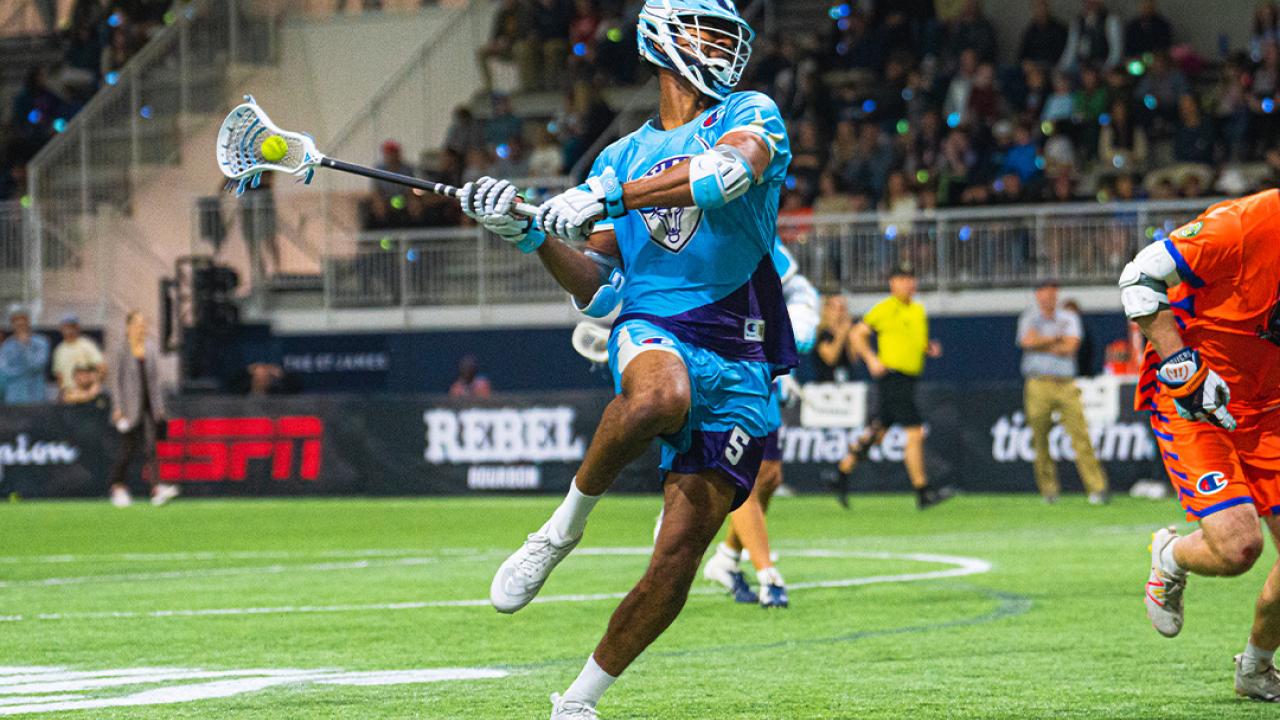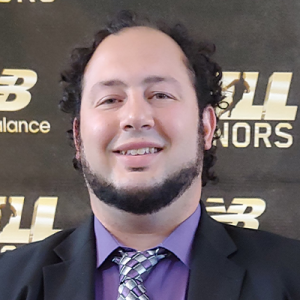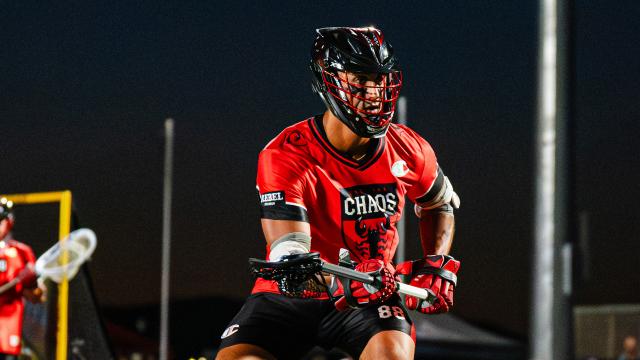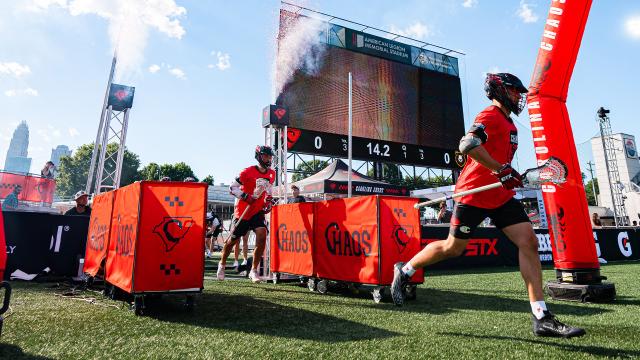
2-Point Line Showcases Re-Emergence of Romar Dennis
Romar Dennis did not look like someone who had just won an award.
Posing for pictures next to Premier Lacrosse League co-founder Paul Rabil on the stage where, just to his left, Chrome players were smiling and doused with celebratory drinks, Dennis kept his lips tight and his eyes down. It was a stark contrast.
“I don’t really care much for the scoring title, to be honest,” he said after the game.
He was exhausted and disappointed. The Atlas had just lost to the Chrome in the finals of the 2023 PLL Championship Series in a game they were winning up until late in the fourth quarter.
He didn’t endure the grueling stretch of five games in five days so he could win a scoring title. It was all about a title. But he did walk away accomplishing his individual goal.
“Individually, like I said, I just wanted to prove I should be in the lineup every game in the summer,” he said. “I’m still pissed that I’ve been sat like four times in the last few years. I think that was ridiculous. So, to whoever our new coach is, I just wanted to prove that I should play.”
The Atlas announced the hiring of Mike Pressler to be the team’s new head coach and general manager on Thursday.
Dennis turned out to be the mega star of the Championship Series. He won the Golden Stick Award as the highest scorer of the tournament, totaling 34 scoring points on four one-point goals and 15 two-point goals while adding four assists.
In the knockout stages of the tournament, he was a focal point of the opposition’s game plan. The Whipsnakes and Chrome installed a basketball-style full-court press, picking him up and faceguarding him before midfield on most occasions.
Steven Brooks, the Atlas coach during the tournament and now Pressler’s assistant, heaped plenty of praise on Dennis.
“Seeing his drive, and seeing his commitment to the game, it’s outstanding,” he said. “You call him, and he’s like, ‘I’m at the gym.’ … I’m shooting.’ His dedication to the game is above and beyond anybody else’s. I think he’s one of the best midfielders in the league.”
He also caught the attention of his peers. Matt Bocklet, who was teammates with Dennis on the Denver Outlaws in 2017, tweeted his thoughts about Sixes: “Stock is skyrocketing: @romardennis & @StevenBrooks44.” The Black Lacrosse Alliance tweeted that Dennis was “changing the game.”
One person who knew how successful Dennis would be was Spencer Ford, who acted as the Atlas assistant for the week.
Ford used to run an indoor league that played a style like Sixes that Dennis participated in while attending St. Mary’s Ryken High School. In a league that also featured future pros like Justin Ward and Jake Carraway, Ford said Dennis dominated.
“He was scoring from midfield,” he said. “The kid was one of the reasons why we changed the league. We dressed the goalies up like box goalies.”
When Dennis was drafted in 2017, Ford was with the Atlanta Blaze and aspired to add him to the team, but he was drafted by the Outlaws in the fourth round of the 10-round draft. The following season, Denver won the 2018 Major League Lacrosse championship. Dennis flashed his range, and Denver finished tied for seventh in the nine-team league in two-point goals with five. Dennis scored four of them, which was only one behind Deemer Class and Max Seibald.
PLL Communications Manager Joe Keegan, who’s also a league stats analyst, has written and spoken about the impact the two-point shot can have in a game. Prior to the Championship Series, he identified Dennis as a player who could thrive in an environment in which the two-point arc was moved in to 13 yards compared to the outdoor game.
Ford saw first-hand the impact the shot had on the game and how a team can shape its roster to make it a weapon in their arsenal.
“We went in [to the Championship Series] with the goal to lead the league in two-point attempts; if we were able to do that, we knew that we were going to lead in two-pointers made, right?” he said. “In 2012, the [Chesapeake] Bayhawks way back when, they decided that they were going to shoot the most twos with the hope that they were going to make the most twos. When you think about it, they scored 29, I think [note: it was 28]. We had like 36 or 37, right? So, if you cut that in half, I mean, you’re getting 18 to 19 extra goals.”
Ford said a big reason lacrosse hasn’t seen the two-point revolution the same way basketball has witnessed the rise of the three-pointer over the past decade is because of the lack of players who can consistently shoot from range successfully.
“[In the Championship Series], the Atlas scored more two-point goals than the other three teams combined,” he said. “So, what that tells you is that there’s not that many two-point shooters out there, right? So, when you can fire the way Romar and Bryan [Costabile] can fire the ball, and you know, you’ve got to think about Myles Jones ... and Sergio Perkovic, but when you can’t fire it from there, you know there’s less guys that can do it, so you still play that traditional style of going for the one.”
In the three round-robin games of the Championship Series, the Atlas were the only team to have a positive scoring differential at plus-27. In the team’s first matchup with the Chrome, the Atlas won 29-20. In that game, Chrome outshot Atlas 49-45, but the Atlas pumped in 11 two-point goals compared to three. While the Atlas still would have technically won 18-17, games are played differently when the score is that tight.
Conversely, it can be a difficult night when the shots aren’t falling. In the championship rematch against the Chrome, the Atlas still scored more two-point goals than Chrome, but the margin was much slimmer, 5-3. On the flip side, the Chrome outscored the Atlas 18-13 on one-point goals, and the Atlas shot only 34 percent compared to Chrome’s 47.7 percent.
It was also Dennis’s toughest outing. Through the first three quarters, he managed only one two-point goal. He did break through with two two-point goals to start the fourth quarter, a moment that seemed like it would ignite the Atlas down the stretch, but the Chrome clawed back with six consecutive scores, including one two-pointer. It was also Dennis’ worst shooting night at 27.3 percent.
Like many of the best players, Dennis was his harshest critic.
“I think about all the plays I want to take back all week,” he said. “It’s like, ‘Why did I shoot that?’ or, ‘Why did I dodge into a double team?’ ‘Why did I get a penalty?’ You just play so dumb when you’re tired. It’s like conditioning, conditioning. I ran a lot. I shot a lot on the run to prepare for this, and it still wasn’t enough.”
Ford, who compared Dennis’s ability to shoot on the run to that of Rabil, said he believed what Dennis did during the Championship Series could translate to the summer season.
“I think this week opened up the eyes of many, many people,” Ford said. “If you go back and watch all the games, he had a few step downs where he caught the ball and shot it, but a lot of what he did he was beating double teams and literally shooting the ball from the run left and right, and so, that right there translated into the outdoor game because it might not be a two, but it could be a way to establish and start great offense where if you get a guy that’s that good that can draw that much attention, you should be able to score no matter what.”
When asked if he thinks Dennis showed enough to be a regular in the summer lineup, Brooks’ answer was clear and succinct.
“Absolutely,” he said. “One hundred percent.”
Phil Shore
Phil Shore has covered lacrosse for a variety of publications. He played Division III lacrosse at Emerson College and is the current head coach at Osbourn Park High School in Virginia. His first book, Major League Life, was published in June 2020. Shore has contributed to USA Lacrosse Magazine since 2011.

Categories
Tags
Related Articles




